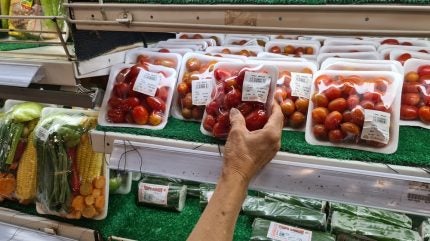
Waste and resources charity WRAP has proposed new restrictions on how uncut fresh fruit and vegetables are sold in the UK. WRAP is a charity registered in the UK that aims to establish a circular economy through waste reduction, the development of sustainable products, and efficient resource utilisation.
The initiative seeks to address the issue of food waste, with a particular focus on reducing the use of packaging for smaller amounts of produce.
WRAP aims to eliminate packaging for 21 key items, such as apples, bananas, and potatoes, which could save an estimated 100,000 tonnes of edible produce from being wasted annually.
Reducing food waste and single-use plastics
The proposed ban would apply to any uncut fruit and vegetables sold in quantities of less than 1.5kg. According to WRAP, households across the UK struggle to buy the correct amount of fresh produce due to packaging practices, leading to significant food waste.
Selling more items loose, WRAP suggests, could prevent the equivalent of eight million shopping baskets’ worth of food from going to waste each year.
In addition to food waste reduction, eliminating packaging for these 21 items could help prevent 13,000 tonnes of single-use film from being used.
The recommendation from WRAP would apply not only to plastic packaging but to all packaging materials used for fresh produce. Items covered in the proposal range from avocados and peppers to onions, tomatoes, and lemons.
A phased approach to implementation
WRAP’s proposal includes a phased approach to the packaging ban, with a suggested timeline for implementation. The charity has partnered with the think tank Policy Connect to explore formal policy changes.
Under this plan, voluntary action would continue until 2027, followed by a three-year lead time for businesses to adjust before the ban is introduced. The plan allows for exemptions for certain organic and fairtrade items, as well as for seasonal bulk-buying occasions like Christmas.
The second phase of the ban would extend to more perishable items, such as berries, soft fruits, and herbs. As part of the next steps, WRAP has recommended a formal consultation, alongside an economic assessment of the potential impacts on businesses across the supply chain.
Environmental and economic impacts
Food waste remains a significant global challenge, with up to 40% of food produced worldwide being discarded before it can be eaten. In the UK alone, 1.7 million tonnes of edible fruit and vegetables are wasted every year, at an estimated cost of £4bn.
Previous campaigns by WRAP have highlighted customer demand for more loose produce options, with many consumers noting that the lack of such items in stores is a barrier to change.
Rob Percival, head of policy for food and health at the environmental charity The Soil Association, recognised the complexity of phasing out packaging for fresh produce. However, he acknowledged that WRAP’s call for action is supported by substantial evidence and aligns with consumer preferences.
WRAP’s next steps include pursuing further consultation and economic assessments to understand the broader impact of such a policy.



